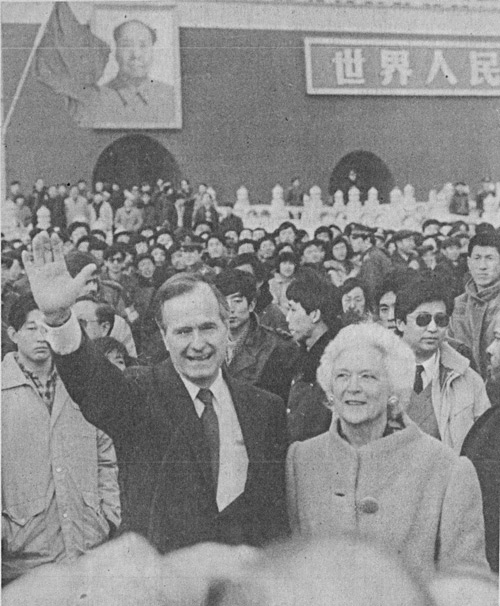|
 |
|
The Bushes mingle with the Chinese people in front of Tiananmen (the Gate of Heavenly Peace) Beijing (QI TIEYAN) |
In February, 17 years ago, President Richard Nixon completed his historic trip to China, which finally led to the normalization of relations between China and the United States. Now, newly elected President George Bush has wrapped up a 39-hour working visit to Beijing, which was described by Chinese leader Deng Xiaoping as being a journey of greater importance than an official one.
Different feelings the two had. China was a strange and mystical land to Nixon before his visit. For Bush, however, the familiar city of Beijing seems to be his second home. He has many old friends here whom he knew when he was the head of the US Liaison Office in 1974-75, as well as those he met during the previous four trips. It appears that it was his nostalgia that drove him back to the city.
Unlike his predecessors, who had only a few ordinary Chinese friends, Bush has many in Beijing. These include those he met at the Chongwen-men Christian Church, a small and simple sanctuary where the Bushes often went to worship many years ago and where their daughter was baptized. The president arrived in late afternoon on February 25. The next morning he and his wife joined some 600 Beijing people in attending a morning prayer meeting at the church. Perhaps, in this manner, Bush showed how he differs from his predecessors. It may also be treated as a sign of a good bilateral relationship, a relationship that is now not only on the level of leader-to-leader but also on that of leader-to-people and people-to-people.
The development of Sino-American relations has been stable, though there have been some problems. "We hope that bilateral relations will develop further during your term," Deng told Bush two hours after the president left the church. The American leader said he agreed with Deng's comments on the relationship.
Deng didn't elaborate on the problems, but it is generally believed that the major stickler is the Taiwan issue. Premier Li Peng said, when holding official talks with Bush, that the Chinese have paid special attention to the Taiwan issue. There are a few Americans who have tried to affect China's policy on various issues and interfere with China's internal affairs. If such practices come from American officials, the existing good relations will be shadowed, the premier said.
Bush said that the United States will firmly carry out the "one China" policy and that it will continue to comply with the principles of the "three communiques." The United States declared this policy to show its objection to the activities of separatists within the Taiwan Island.
The "three communiques" are: the Shanghai Communique, February 27, 1972; communique on the establishment of diplomatic relations, December 15, 1978; and the communique of August 17, 1982. The day Bush concluded his short visit marked the 17th anniversary of the Shanghai Communique, which contained the significant statement: The United States acknowledges that all Chinese on either side of the Taiwan Straits maintain there is but one China and that Taiwan is a part of China.
In regard to the Soviet Union, Deng said China hoped that Sino-Soviet normalization can be realized and that Gorbachev's reform would succeed. Also, he added, China hoped that the United States and the Soviet Union will improve their relations.
Bush said the United States welcomes Gorbachev's forthcoming visit to China and the improvement of Sino-Soviet relations which, he said, will be beneficial to peace and stability.
When meeting with Bush, Zhao Ziyang, general secretary of the Communist Party of China, said China will not export its own system and won't copy other countries' systems either.
Zhao said there are two trends of thought in China, both of which are going to extremes and reinforcing each other. There are those who think the reform has developed on a wrong track and should be reversed. There are others who regard the difficulties as political in nature and urge solutions based on Western models.
The first group will get no support from the people, whereas the other group completely ignores the particular circumstances in China and their ideas are therefore not feasible. If the latter view prevailed, the reform would encounter obstacles that would cause setbacks and have serious consequences, Zhao pointed out.
Zhao said support given by certain figures in the United States to people showing resentment against the Chinese government is both detrimental to the stability of China's political situation and harmful to Sino-U.S. friendship. | 